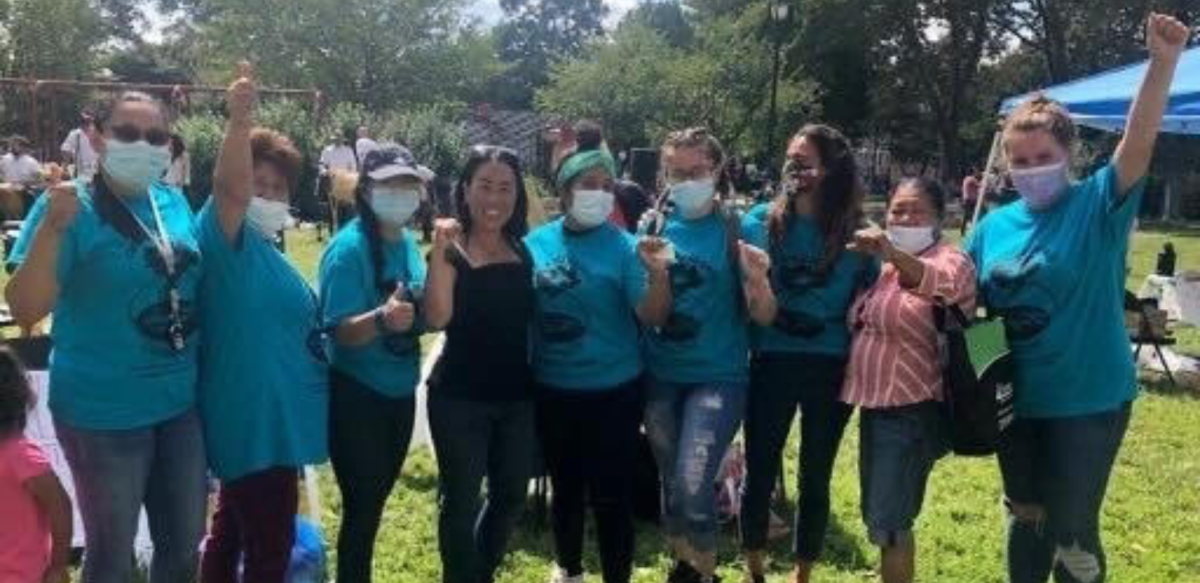'Above All, Don't Stay Quiet': Philly Immigrant Workers Organize to Change the Restaurant Industry

Philadelphia restaurant workers will join several hundred other labor activists at the National Conference on Worker Safety and Health (COSHCON22) in December. Photo courtesy of author.
The first time Yuris Reyes asked for paid sick leave, she was turned down. “My bosses told me that paid sick leave was only for the managers and not something I was entitled to,” says the Philadelphia restaurant worker.
That didn’t sound right to Yuris, who is a member of El Comité de Trabajadorxs de Restaurante (the Restaurant Workers Committee), a local advocacy group. She filed an anonymous complaint about her employer with the city of Philadelphia, which has had a paid sick leave law on the books since 2015.
The next time she was ill and needed a leave, Yuris showed her employers a link to the relevant city law. “I had fever-like symptoms and I called out sick. When I came back, I was paid for all my sick time, without an issue in my next check. Sometimes, I think that they think that because I'm Hispanic, and came to this country to work, that I don't know my rights or won't fight for them.”
El Comité committee is sponsored by the Coalition for Restaurant Health and Safety (CRSH) and 215 People’s Alliance. CRSH has been supported by PhilaPOSH, a labor and community-based organization with a long track record of advocating for safer workplaces. PhilaPOSH is an affiliate of my organization, the National Council for Occupational Safety and Health (National COSH).
In early December, members of El Comité will join several hundred workers and labor activists at the National Conference on Worker Safety and Health (COSHCON22). It’s a place where workers like Yuris can gather more information and resources about building power in the workplace to confront and reduce the risk of occupational hazards.
One issue we’ll definitely cover is the ongoing risk of Covid-19. Although President Biden declared the coronavirus pandemic to be “over” in September, the reality is far different for frontline workers, in restaurants and other industries, who are exposed to the risk of infection on a daily basis.
While there is no effective tracking of workplace exposures, illnesses, and fatalities from the virus, insurance company claims indicate that deaths among the working-age population, between 18 and 64 years of age, have increased by as much as 40 percent from pre-pandemic levels. Age-adjusted data shows that Latinx, Black, Pacific Islander and Indigenous populations suffer far higher death rates than whites. These same populations are frequently over-represented in high-risk frontline industries such as slaughterhouses, nursing homes, and corrections facilities, and often experience disparities in access to health care.
A LIFELINE FOR IMMIGRANT WORKERS
During the pandemic, El Comité became a lifeline for immigrant workers, as many lost their jobs during restaurant shutdowns and others were forced to work in hazardous conditions without proper social distancing or access to protective gear. Members played a key role in convincing the Philadelphia City Council to update and then renew the city’s paid sick leave ordinance to include specific protections for workers with symptoms of Covid-19, and those caring for family members.
“We took a survey of 300 restaurant workers from the area and made calls to legislators and won,” says Yuris. Workers also presented testimony about the need for sick leave at two City Council hearings.
Getting an improved law on the books was just the first step. Led by a steering committee that meets weekly, worker leaders discovered that many workers report for their shifts with Covid or other illnesses because they do not know they are entitled to sick leave. Unsurprisingly, employers do not provide this information.

SUPPORT LABOR NOTES
BECOME A MONTHLY DONOR
Give $10 a month or more and get our "Fight the Boss, Build the Union" T-shirt.
To fill the gap, El Comité has organized a series of training sessions for restaurant workers, explaining their rights under the new law and the steps necessary to file a complaint. “There’s so much of a knowledge gap in the Hispanic community about our rights,” says Yuris. “I didn’t know anything about my rights until I started attending the workshops.”
El Comité’s groundbreaking work in reaching and mobilizing a mostly immigrant workforce is winning national recognition. In September, Yuris represented El Comité at a summit convened by the U.S. Occupational Safety and Health Administration (OSHA), intended to create bridges between workers and the agency charged with enforcing U.S. safety laws. She was unimpressed.
“It was a pretty frustrating experience,” says Yuris, who was among dozens of worker leaders from COSH groups, worker centers, and labor unions who attended the event. “I heard so many stories of abuse, and OSHA doesn’t do much or give workers the support we need.”
Last year, National COSH recognized El Comité and CRSH with a Worker Justice award at COSHCON21.
“Restaurants are complaining about the so-called ‘worker shortage',” said CRSH and El Comité Coordinator Natalia Nicastro, accepting the award. “But [they] continue to offer miserable working conditions and are asking workers for too much. More than half of working moms say they are leaving the restaurant industry not only because the pay was too low but because the risk of contracting COVID and experiencing harassment were too high.”
The fight to reduce occupational hazards requires solid information about workplace conditions and current law. But the real contest isn’t over legal or technical information. It’s about power.
Restaurant workers, says Yuris, “need to unite and raise their voices, to not be afraid because they can do great things for their children who won’t have to go through what they went through at work.”
“Above all, don’t be quiet.”
Melissa Moriarty is storytelling and communications strategist at National COSH. The National Conference for Worker Safety and Health (COSHCON22) will convene virtually this year from December 6 thru 8 and December 13 thru 15. Scholarships are available for workers and students.



